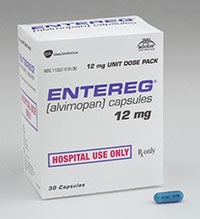 The FDA has announced it will vote this week on whether a class of drugs that treat opioid-induced constipation needs more clinical testing in light of a side effect: heart attack. The class of drugs includes recently approved products from Salix Pharmaceuticals ($SLXP) and Cubist Pharmaceuticals ($CBST) but also one that AstraZeneca ($AZN) is developing with Nektar Therapeutics ($NKTR).
The FDA has announced it will vote this week on whether a class of drugs that treat opioid-induced constipation needs more clinical testing in light of a side effect: heart attack. The class of drugs includes recently approved products from Salix Pharmaceuticals ($SLXP) and Cubist Pharmaceuticals ($CBST) but also one that AstraZeneca ($AZN) is developing with Nektar Therapeutics ($NKTR).
The agency's advisory meeting on anesthetic and analgesic drug products, slated for two days beginning June 11, will examine if it's safe for patients taking opioids for chronic pain to begin concomitant treatment for constipation brought on by the painkillers with opioid receptor antagonists.
The key drugs here include Salix Pharmaceuticals' Relistor (methylnaltrexone); Cubist Pharmaceuticals' Entereg (alvimopan); and Movantik (naloxegol), which AstraZeneca and Nektar Theraputics have in development. Theravance ($THRX) is also developing a drug, axelopran, and Develco Pharma is working on a sustained-release version of naloxone, used in opioid addiction pills at a fixed dosage.
The class of drugs, put simply, works by counteracting receptors that painkillers bind to in the gastrointestinal tract. But the FDA needs to now make sure it's not putting a new class of drugs that may cause cardiac arrest on the market. The advisory panel will decide whether the drugs pose cardiovascular risk, whether to carry out a safety trial and finally whether the trial--if it gets the green light--will include all drugs in the class.
"A potential cardiovascular safety signal observed in the development program for one opioid antagonist (Entereg) has raised questions regarding the amount and type of clinical safety data necessary to support approval of other opioid antagonists intended to treat OIC," the FDA writes in its briefing document.
While Entereg--along with Relistor--has been approved by the FDA and marketed, it is still restricted to hospital use only, and is capped at 15 doses until the agency decides further. A late-stage study for Entereg showed more heart attacks in patients who were taking the drug, prompting the agency to look at the class of drugs as a whole and ask for more available safety data.
"Controlled, long-term safety data, similar to that which generated the potential CV (cardiovascular) safety signal for Entereg, seem critical for preliminary assessment of CV risk for the development of other drugs in this class," the FDA writes.
The FDA last year expressed its concerns to AstraZeneca over Movantik, and also pointed to the possibility of heart attacks as a result of withdrawal from the drug. It also met with Theravance and Develco, inviting them to make safety presentations on their drugs during the advisory meeting this week for consideration.
The World Health Organization estimates that the U.S. had 116 million people suffering from chronic pain in 2011: a big market for Big Pharma if the opioid-induced constipation drugs are approved this week. Nektar took $70 million from AstraZeneca for Movantik last November. Analysts at research firm GlobalData say the opioid-induced constipation market will reach nearly $2 billion by 2017, but caution extensive marketing will be necessary for it to win over the laxative market.
- here's the FDA briefing document (PDF)
- get more from Reuters
- and here's GlobalData's forecast